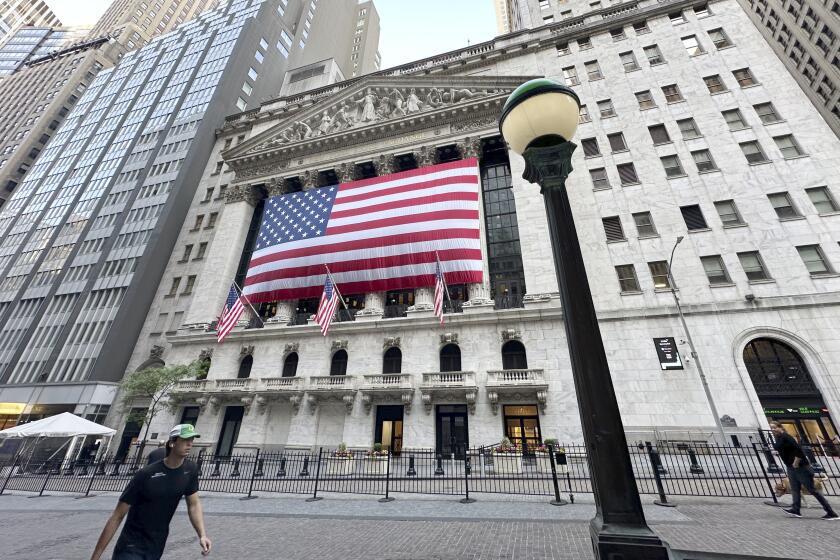An Institution Is Fading Away In Long Beach : Procter & Gamble Closing Plant It Opened in 1931
On the fourth floor of a concrete Depression-era factory in Long Beach, seemingly endless lines of white Ivory soap bars rumble along conveyor belts toward machines that wrap them in blue and white.
Across an alley, row upon row of familiar orange and blue boxes containing Tide laundry detergent stand like so many soldiers awaiting orders.
The scene has been little changed for 56 years at this Procter & Gamble factory. But one day soon the place will close down, a victim of corporate economics.
Built in 1931 on a man-made peninsula at the Port of Long Beach within easy reach of the docks to which raw materials were shipped, the plant has produced--besides Ivory and Tide--such well-known American household staples as Cheer and Bold laundry detergents, Cascade dish washing detergent, Crisco shortening and Puritan oil.
Housed in classic gray factory buildings that conjure images of the Great Depression era in which it was born, the plant has employed some families for generations.
“I grew up with the company,” said Dario Melchiori, a warehouse shipper who has worked there for 18 of his 38 years.
His father and uncle, he said, retired after careers at the company that spanned 38 and 35 years respectively, and another uncle still works at the plant after 30 years.
“I’ve been with the company since I was born,” said Melchiori, who lives in Riverside. “It’s my family.”
But the factory, which now employs 420 workers, will be closed by Oct. 2, 1988, and the “family” will be scattered.
Officials of Procter & Gamble, the Cincinnati-based consumer products giant, say that the items manufactured at the Long Beach plant can be produced more economically at some of the company’s 120 other facilities, which are located throughout the world.
“It’s a big loss,” said Melchiori. “I’m not sure what I’ll do.”
Said Hattie Greenhouse, who lives in Compton and has worked as an administrative assistant in the company’s financial department for the last eight years: “I’m sad. It means hitting the job market again.”
The demise of the Long Beach plant--one of the oldest P&G; facilities on the West Coast--is part of an $800-million company-wide restructuring announced earlier this month. Faced with recent consolidations in the operations of key raw material suppliers, coupled with technological improvements that allow the production of more volume with less equipment, company officials have decided to do some consolidating of their own by closing some of their factories that make similar products.
The result, promises P&G; Chairman John G. Smale, will be a “stronger, more competitive company” better prepared to show future growth in earnings.
Closures had been announced earlier in Omaha, Cincinnati and Green Bay, Wis.
“I was just stunned when I first heard the news,” said Elaine Hutchison, chairman of the Long Beach Area Chamber of Commerce. “There’s almost a sense of disbelief. We have all become acc1970500719here.”
John Shirey, assistant city manager, said: “People were taking Procter & Gamble for granted. This just brings us all back to the reality that any employer can be here today and then gone tomorrow.”
While city officials and community leaders unanimously decry the loss of the plant, many also admit that their concerns may have more to do with nostalgia than with economics.
Built on a site originally constructed for the 1928 Long Beach World Exposition, the company was the second major manufacturer (following Ford Motor Co., which has since left) to locate in Long Beach and once served as one of the city’s largest employers. During the Depression, when work was scarce, the plant--which began with 50 employees and has never suffered a strike or been shut down--provided local jobs.
In 1941, according to a history published by the facility for its 50th anniversary, the Army installed anti-aircraft batteries on the plant’s roofs and covered its windows with black curtains to camouflage interior lights.
Spurred City’s Growth
After World War II, according to Hutchison, the plant played a major role in promoting the growth of the city by providing employment to former military personnel home from the war. “Many of them,” she said, “were able to find work at P&G; and therefore could return to the community, get married and raise families in Long Beach.”
Since then, Hutchison said, the city has grown to the point where it now hosts enough other major companies to more easily absorb the plant’s loss. “Procter & Gamble’s willingness to be in Long Beach provided a stability that allowed the community to grow and that growth has really taken off,” she said.
Representatives of the port have already expressed interest in purchasing the site, which they say could be turned into marine terminals that would create almost as many jobs as the plant’s closure will eliminate.
And though Tom Clark, a former mayor and now city councilman, last week asked the city manager to initiate talks with P&G; to determine whether there is anything the city can do to change the company’s mind about leaving, even he admits that such an outcome is unlikely. “An operation that’s been (around) for that many years becomes a part of your community,” Clark said. “There’s a little nostalgia attached to a plant that age.”
Company officials say they intend to do everything they can to help employees adjust to the change. Some, they say, will be offered transfers to P&G; plants elsewhere. Others will be provided with help in securing alternative employment locally, or retrained for different career paths. All, they say, will be offered generous severance packages that are already being negotiated with an employee association.
“We’re a people-oriented company,” plant spokesman James Paulk said. “When we brought people here, we wanted them to feel they’d be here forever. That’s why people wanted their kids to work here. That’s why an announcement like this is so traumatic.”
Not everyone, however, is upset.
Plan New Careers
Albert Wilson, of Lynwood, said he hopes to cap 10 years on the Tide line by opening his own karate school. Manuel Vasquez, a San Pedro resident who has spent 12 years making Ivory soap, says he intends to take advantage of the situation by finally realizing his lifelong dream of becoming a firefighter. And Carolyn Lutes, a secretary for 10 years who has a twin sister working in the plant, says she plans to move with her two teen-age children onto two acres of land the family owns in Northern California.
“I don’t look at it as being hard,” said Lutes, 38, of Garden Grove. “I look at it as an opportunity, really. And I think others will, too, once they get into it.”
At the moment, though, the predominant mood at the plant seems to be one of bewilderment and concern.
Jim Powell, a laboratory analyst for 13 years, is 44 years old and very worried about the prospect of having to look for another job. “I’m disappointed,” said Powell, adding that his wife will probably have to go to work to help support their two children while he seeks other employment. “You see this happening around the country but when it happens to you, you feel all alone. Right now we’re all kind of confused.”
Sometimes that confusion expresses itself in bitterness.
Walking to their cars at shifts’ end a few days after the closure was announced, two middle-aged women had little good to say about the situation they found themselves in.
“I feel hurt,” said one, who would not give her name but said she had been making bar soap on and off since 1962 and regularly for 14 years. “I’ve worked so hard on the same job for all these years and now I’m almost 50 and what do I have to look forward to? Nothing.”
Added her friend who, at 47, has been working at the plant for 18 years: “I feel like we’ve all been used. For a lot of people it’s going to be hard.”






